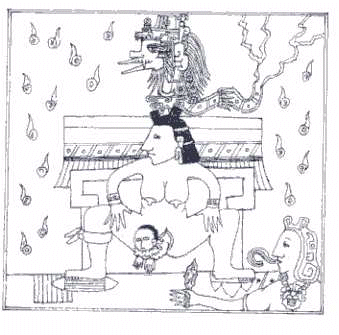Laura Esquivel
Ernesto Mestre-Reed,
Translator
(Atria)
Along with the attempt to rehabilitate Malinche, Esquivel attempts to humanize Cortés and the Spaniards, but it is a tough go. Malinche may be in lust with him but soon comes to have doubts that he is Quetzalcóatl. His passion for gold, his destruction of the city of Tenochtitlán, the murder of his wife, imported from Spain for the purpose, does lead to a few doubts.
 Some of us were quite struck with Esquivel's Like Water for Chocolate if for no other reason than the delicious recipes for molé and tamale pie. But her newest work is less tamale and more soft soap.
Some of us were quite struck with Esquivel's Like Water for Chocolate if for no other reason than the delicious recipes for molé and tamale pie. But her newest work is less tamale and more soft soap.
It is also a tad unbelievable and often the language heats up and runs off the page and falls into the toilet. This is Malinche being introduced to Cortés's verge: "The clouds in the sky began to move with extraordinary swiftness. The air became laden with humidity, moistening the feathers of birds and the leaves of the trees, as well as Malinalli's vagina. The gray clouds, like Cortés's member, made a great effort to contain their waters, to hold back, not to let them fall, so that their precious liquid would not be released."
Despite the damp, she starts in to telling him about the Nahuatl divines. Cortés asks, before throwing himself on her, "And what is that god?"
Malinelli opts for a little coitus interruptus in order to respond: "Eternal, the same as yours, but his eternity is not invisible like yours. Our god evaporates, makes designs in the sky, moves whimsically through the clouds, shouts out his presence, spills his consciousness, and quenches out thirst and fear."
 Thus pre-colonial congress. As an inhabitant of today's Mexico City would opine, "A ella le gusta bastante crema en su taco." (She sure likes a lotta cream on her taco.)
Thus pre-colonial congress. As an inhabitant of today's Mexico City would opine, "A ella le gusta bastante crema en su taco." (She sure likes a lotta cream on her taco.)
This silliness doesn't erupt like Popocatépetl in the midst of the story, it's there from the get-go. This is Malinalli's father, gazing lovingly upon her a few days after her birth,
- Here you are, my awaited daughter, whom I dreamed about, my necklace of fine jewels, my quetzal plumage, my human creation, engendered by me. You are my blood, my color, in you is my image. My little girl, look on peacefully. Here is your mother, your lady, from her belly, from her womb, you were engendered, you sprouted. As if you were a leaf of grass, you sprouted.
Daddy disappears soon afterwards, thank god, but then Grandmother takes up the oracular work, in a similar vein, until, to our great relief, Cortés arrives to lay to waste the entire nation.
Though I couldn't get a copy of the original Spanish version of Malinche, I suspect that some of this nonsense comes from the translator. When Malinche finally meets her long lost mother, we are told "With rage and with beauty, Malinalli tore her eyes away from her mother's gaze and returned them again to her brother. Her face softened and her eyes, full of tenderness, kissed the face of her lost brother." After these butterfly kisses, Malinche returns to find her long lost son. "When the boy looked at his mother he did not cry, but amply took her in, before falling asleep again in her lap." That's amply, as in chock-full. Of nuts.
 Despite these verbal and physical blowoffs, there are a couple of prizes to be found between the sheets of Malinche. One is the drawings by Jordi Castells. Actually, if they had done the whole pot as a graphic novel, it would have been dandy because we could while away our time looking at the pictures and ignoring all this engendered-leaf-of-grass-sprouting business.
Despite these verbal and physical blowoffs, there are a couple of prizes to be found between the sheets of Malinche. One is the drawings by Jordi Castells. Actually, if they had done the whole pot as a graphic novel, it would have been dandy because we could while away our time looking at the pictures and ignoring all this engendered-leaf-of-grass-sprouting business.
Too, there is a strong stink that blows through Malinche upon the arrival of the Cortés and his nasty bunch. Malinelli "never expected that the emissaries of Quetzalcóatl would smell so bad. Cleanliness was common practice among the natives."
- The Spaniards, on the other hand, did not bathe, their clothes reeked, and neither water nor the sun could rid them of their stench. No matter how much she scrubbed and scrubbed the clothes in the river, she wasn't able to wash from them the smell of rotted iron, of metallic sweat, of rusted armor.